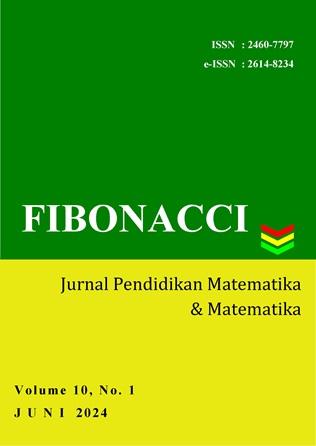Pengembangan Media Pembelajaran Berbasis Aplikasi Wolfram Mathematica Pada Materi Fungsi dan Permodelannya
Main Article Content
Abstract
Article Details
Authors who publish with this journal agree to the following terms:
- Authors retain copyright and grant the journal right of first publication with the work simultaneously licensed under a Creative Commons Attribution License that allows others to share the work with an acknowledgement of the work's authorship and initial publication in this journal.
- Authors are able to enter into separate, additional contractual arrangements for the non-exclusive distribution of the journal's published version of the work (e.g., post it to an institutional repository or publish it in a book), with an acknowledgement of its initial publication in this journal.
- Authors are permitted and encouraged to post their work online (e.g., in institutional repositories or on their website) prior to and during the submission process, as it can lead to productive exchanges, as well as earlier and greater citation of published work (See The Effect of Open Access).
References
Adawiyah, R., Amin, S. M., Ibrahim, M., and Hartatik, S. (2021). Peningkatan Ketuntasan Hasil Belajar Siswa Sekolah Dasar Pada Pembelajaran Tematik Melalui E-LKPD dengan Bantuan Aplikasi Google Meet. Jurnal Basicedu, 5(5), 3393–3398. https://doi.org/10.31004/basicedu.v5i5.1339
Aiken, L. R. (1985). Three coefficients for analyzing the reliability and validity of ratings. Educational and Psychological Measurement, 45(1), 131–142.
Astuti, V. D., Muthmainnah, R. N., and Rosiyanti, H. (2021). Pengembangan Media Pembelajaran Aplikasi Pokamathh Pada Materi Aljabar Kelas Vii. FIBONACCI: Jurnal Pendidikan Matematika Dan Matematika, 7(1), 1. https://doi.org/10.24853/fbc.7.1.1-10
Augustha, A., Susilawati, and Haryati, S. (2021). Pengembangan E-LKPD Berbasis Discovery Learning Menggunakan Aplikasi Adobe Acrobat 11 Pro Extended Pada Materi Kesetimbangan Ion dan PH Larutan Garam Untuk Kelas XI SMA/MA Sederajat. Journal of Research and Education Chemistry, 3(1), 28. https://doi.org/10.25299/jrec.2021.vol3(1).6485
Dewi, N. A., Purnamasari, R., and Karmila, N. (2023). Pengembangan E-LKPD Berbasis Webiste Wizer. Me Materi Sifat-Sifat Bangun Ruang. Didaktik : Jurnal Ilmiah PGSD FKIP Universitas Mandiri, 9(2), 2562–2575. https://doi.org/https://doi.org/10.36989/didaktik.v9i2.995
Fadhila, A. N. (2022). Pengembangan E-LKPD Berbasis PBL Menggunakan Flip PDF Professional untuk Meningkatkan Literasi Sains pada Materi Medan Magnet. Nusantara: Jurnal Pendidikan Indonesia, 2(1), 53–70. https://doi.org/10.14421/njpi.2022.v2i1-4
Hidayah, A. N., Winingsih, P. H., and Amalia, A. F. (2021). Pengembangan E-LKPD (Elektronik Lembar Kerja Peserta Didik) Fisika Dengan 3D Pageflip Berbasis Problem Based Learning Pada Pokok Bahasan Kesetimbangan Dan Dinamika Rotasi. Compton: Jurnal Ilmiah Pendidikan Fisika, 7(2), 36–43. https://doi.org/10.30738/cjipf.v7i2.9091
Hidayat, F., and Nizar, M. (2021). Model ADDIE (Analysis, Design, Development, Implementation and Evaluation) dalam Pembelajaran Pendidikan Agama Islam. Jurnal Inovasi Pendidikan Agama Islam (JIPAI), 1(1), 28–37. https://doi.org/https://doi.org/10.15575/jipai.v1i1.11042
Hiyam, B., Zoubi, A., and Khataybeh, A. (2019). Utilizing Mathematica Software to Improve Students’ Problem Solving Skills of Derivative and its Applications. International Journal of Education and Research, 7(11).
Kemdikbud. (2019). Laporan Hasil Ujian Nasional. Retrieved February 2, 2024, from https://hasilun.pusmenjar.kemdikbud.go.id
Maribe Branch, R. (2009). Instructional Design: The ADDIE Approach. In Springer. New York: Springer.
Murtianto, Y. H., Nizaruddin, N., and Sutrisno, S. S. (2022). The Validity of a Multiple Representation of Calculus With Mathematica Learning Tool for Improving Students’ Productive Thinking Abilities. KnE Social Sciences, 2022. https://doi.org/10.18502/kss.v7i14.12012
Musyrifah, E., Rabbani, H., Sobiruddin, D., and Khairunnisa. (2021). Development of wolfram mathematica application-assisted learning module on derivative in high school. Journal of Physics: Conference Series, 1836(1).
Panjaitan, S. N., Mansyur, A., and Syahputra, H. (2023). Pengembangan LKPD Elektronik (E-LKPD) Berbasis Problem- Solving untuk Meningkatkan Kemampuan Pemecahan Masalah Matematis dan Kemandirian Belajar Peserta Didik SMP IT Indah Medan. Jurnal Cendekia : Jurnal Pendidikan Matematika, 7(2).
Perbawa, K. A., and Diana. (2022). Application of Linear Congruential Generator (LCG) Algorithm in Android Based Mathematics Education Game. Jurnal Komitek, 2(1), 47–56. https://doi.org/https://doi.org/10.53697/jkomitek.v2i1.599
Purnama, I., Murtianto, Y. H., and Muhtarom. (2022). Desain Modul Berorientasi Literasi Matematika dengan Bantuan Aplikasi Wolfram Mathematica untuk Materi Artimatika Sosial. Jurnal Cendekia : Jurnal Pendidikan Matematika, 6(3).
Retnawati, H. (2016). Analisis kuantitatif instrumen penelitian (panduan peneliti, mahasiswa, dan psikometrian). Yogyakarta.
Shalahuddin, M. H., and Hayuhantika, D. (2022). Pengembangan E-LKPD Berbasis Kontekstual dengan Media Liveworksheets Pada Materi Lingkaran di Kelas VIII. Jurnal Tadris Matematika, 5(1), 71–86. https://doi.org/10.21274/jtm.2022.5.1.71-86
Shobrina, N. Q., Sakti, I., and Purwanto, A. (2020). Pengembangan Desain Bahan Ajar Fisika Berbasis E-Modul Pada Materi Momentum. Jurnal Kumparan Fisika, 3(1), 33–40. https://doi.org/10.33369/jkf.3.1.33-40
Subagja, L. B. (2022). Pengaruh model pembelajaran problem based learning (PBL) berbantuan aplikasi berbasis website wordwall.net dan e-LKPD wizer.e terhadap motivasi belajar siswa. Jurnal Inovasi Pendidikan Matematika, 3(2), 141–150. https://doi.org/10.30587/postulat.v3i2.5042
Subakti, D. P., Marzal, J., and Hsb, M. H. E. (2021). Pengembangan E-LKPD berkarakteristik budaya jambi menggunakan model discovery learning berbasis STEM untuk meningkatkan kemampuan berpikir kreatif matematis. Jurnal Cendekia: Jurnal Pendidikan Matematika, 05(02), 1249–1264.
Syafruddin, I. S., Pamungkas, A. S., Khaerunnisa, E., and Rafianti, I. (2022). Pengembangan E-LKPD untuk Mendukung Kemampuan Literasi Matematis pada Materi Aritmatika Sosial. Jurnal Cendekia : Jurnal Pendidikan Matematika, 6(3).
Torrence, B. F., and Torrence, E. A. (2019). The Student’s Introduction to Mathematica and the Wolfram Language. In The Student’s Introduction to Mathematica and the Wolfram Language. New York: Cambridge University Press.
Wijayanti, R., Yusmin, E., and Fitriawan, D. (2023). Pemahaman Konsep pada Materi Fungsi Eksponensial Ditinjau dari Gaya Belajar Siswa di SMA. EQUALS: Jurnal Ilmiah Pendidikan Matematika, 6(1).
Winarni, E. W. (2018). Teori dan Praktik Penelitian Kuantitatif, Kualitatif, Penelitian Tindakan Kelas (PTK), dan Research and Development (R&D). Jakarta: Bumi Aksara.

